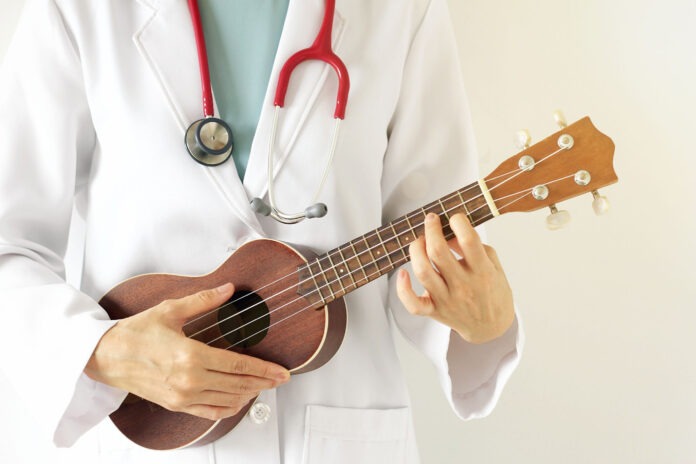At Rutgers New Jersey Medical School, first-year students are discovering that medicine is not only a science but also an art. Under the guidance of Dr. Andrew Berman, a pulmonologist and professor of medicine, the traditional lecture hall is being transformed into a space where pop music, classical paintings, and creative exercises are woven into the curriculum to foster empathy, observational skills, and holistic patient care.
This approach aligns with a growing national trend. Across the United States, medical schools are increasingly integrating the humanities into their programs, recognizing that cultivating skills beyond rote memorization—such as emotional intelligence, careful observation, and attentive listening—can shape better physicians. Schools such as Mount Sinai, Yale, Stanford, and the University of Pennsylvania have all embraced similar initiatives. At Rutgers, this effort is supported by the Healthcare Foundation of New Jersey Center for Humanism and Medicine, which champions compassion, reflection, and human-centered care in medical education.
Berman, who leads the pulmonary and critical care division, has been gradually embedding music and art into first-year courses, starting lessons with songs that explore themes of air and breath or displaying artwork that parallels physiological concepts. For instance, Van Gogh’s Starry Night serves as a creative analogy for turbulent airflow in the lungs, while songs like Taylor Swift’s Breathe or Post Malone’s Hold My Breath underscore lessons on ventilation and respiration. These moments encourage students to slow down, focus, and engage with the material in a meaningful way, while also creating a classroom environment that feels approachable and human.
The first-year curriculum itself covers the full spectrum of foundational medical sciences—biochemistry, genetics, cell biology, hematology, immunology, and infectious disease—as well as detailed studies of organ systems, including the cardiovascular, pulmonary, renal, musculoskeletal, and integumentary systems. Berman’s integration of humanities into this demanding schedule is designed not only to illuminate complex topics but also to model the humanistic side of physician training, emphasizing observation, interpretation, listening, and reporting—skills that are essential both in the clinic and in everyday life.
Students respond positively to the approach, with many noting that these creative exercises help reduce stress and foster engagement. Second-year student José Toribio described a lecture on infectious lung diseases that began with Johnny Rivers’ Rockin’ Pneumonia and the Boogie Woogie Flu as “a perfect example of how humor, music, and history can revitalize challenging topics while reminding us that medicine is ultimately about helping people live better lives.” By connecting clinical content with music and visual arts, Berman nurtures a reflective mindset, allowing students to consider not only the mechanics of disease but also the lived experiences of their patients.
The program extends beyond the classroom. Through initiatives like the Vocal Chords a cappella ensemble, community service projects, and the student literary journal Ars Literarium, students gain outlets for creative expression, stress relief, and exploration of the human experience. These activities strengthen resilience, encourage empathy, and provide tools for effective communication, all while reinforcing the principle that patient care is as much about understanding people as it is about treating conditions.
The incorporation of humanities also complements Rutgers NJMS’ broader mission of cultivating well-rounded, socially conscious physicians. Today’s medical students are entering the field with diverse life experiences, many shaped by the challenges of the COVID-19 pandemic. Understanding the social determinants of health, recognizing patient context, and practicing compassionate care are central to the school’s educational philosophy, preparing graduates to excel in a healthcare system that demands both technical expertise and emotional intelligence.
Rutgers’ commitment to innovation in medical education is further reflected in its ongoing plan to merge NJMS with Robert Wood Johnson Medical School into a single Rutgers School of Medicine, with accreditation expected by 2027. This unified institution aims to strengthen medical training in New Jersey while maintaining a focus on community-centered care and humanistic principles, ensuring that students at both campuses receive a balanced, comprehensive education.
By blending music, art, and clinical science, Dr. Berman and Rutgers NJMS are redefining what it means to train a modern physician. The program demonstrates that integrating humanism into medical education not only enhances technical skills but also cultivates empathy, observation, and reflection—qualities that make doctors better caregivers and better members of their communities. Students who experience this curriculum leave not just with knowledge of anatomy and physiology, but with a deeper understanding of the people they will serve, ready to approach medicine as both a science and a profoundly human endeavor.
For those interested in exploring more about wellness, health, and education initiatives across New Jersey, Explore New Jersey’s Health & Wellness section provides resources, guides, and stories highlighting innovative programs and transformative experiences in the state.












